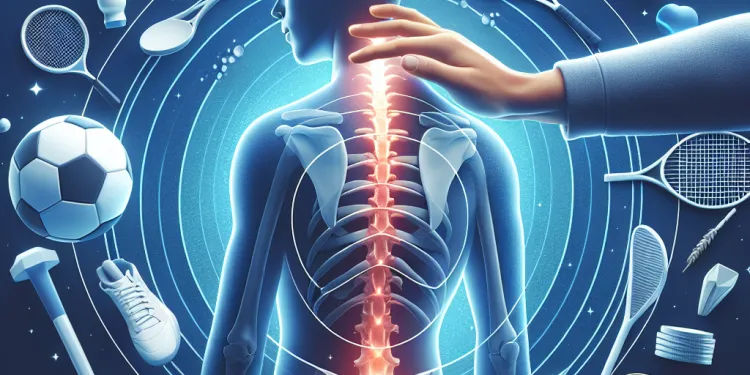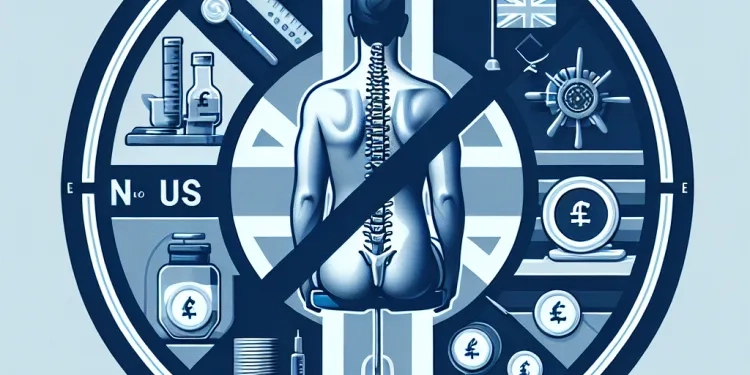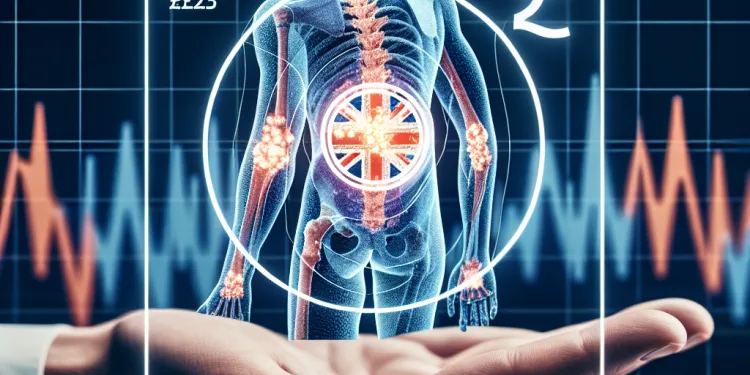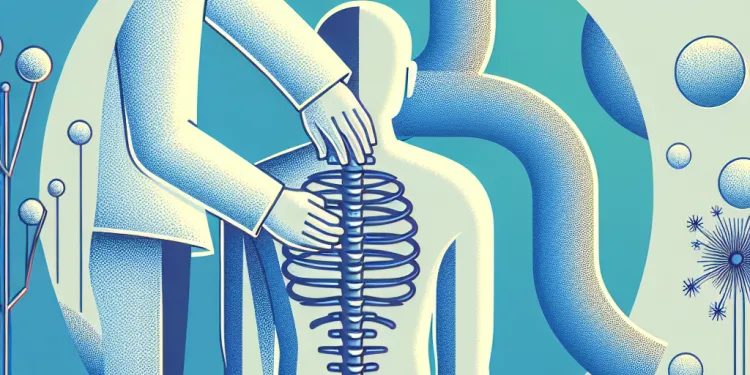
Find Help
More Items From Ergsy search
-

Do chiropractors only treat the spine?
Relevance: 100%
-

How do chiropractors treat back pain?
Relevance: 68%
-

What does a Chiropractor do?
Relevance: 63%
-

Do chiropractors prescribe medications?
Relevance: 55%
-

Can chiropractors help with sports injuries?
Relevance: 50%
-

Do I need a referral to see a chiropractor?
Relevance: 50%
-

How often should I see a chiropractor?
Relevance: 44%
-

What qualifications does a chiropractor need?
Relevance: 43%
-

Chiropractic Care on the NHS
Relevance: 38%
-

Are chiropractic treatments painful?
Relevance: 36%
-

Can chiropractors help with headaches?
Relevance: 36%
-

What is a chiropractic adjustment?
Relevance: 33%
-

Are chiropractic treatments safe?
Relevance: 30%
-

Can chiropractic care help with arthritis?
Relevance: 26%
-

Can children benefit from chiropractic care?
Relevance: 26%
-

How long does a chiropractic session usually take?
Relevance: 24%
-

What is the popping sound during a chiropractic adjustment?
Relevance: 24%
-

Can HPV be treated?
Relevance: 21%
-

Can appendicitis be treated with antibiotics?
Relevance: 21%
-

Can Lyme disease be treated?
Relevance: 20%
-

Can antibiotics treat norovirus?
Relevance: 20%
-
Can eating disorders be treated?
Relevance: 20%
-

Can measles be treated?
Relevance: 20%
-

What areas can be treated with Botox?
Relevance: 20%
-

What conditions is Omeprazole used to treat?
Relevance: 19%
-

How is impetigo treated?
Relevance: 19%
-

Can methanol poisoning be treated?
Relevance: 19%
-

Can scabies be treated over-the-counter?
Relevance: 19%
-

Treating prostate cancer
Relevance: 19%
-

How is scabies treated?
Relevance: 19%
-

How to treat tonsillitis | NHS
Relevance: 19%
-

Can H3N2 be treated with antiviral medications?
Relevance: 19%
-

How to treat a scald burn
Relevance: 18%
-

How is fungal meningitis treated?
Relevance: 18%
-

How to treat a sprained ankle
Relevance: 18%
-

How is sunburn treated?
Relevance: 18%
-

How is jaundice in newborns treated?
Relevance: 18%
-

Can flesh-eating disease be treated?
Relevance: 18%
-

How to treat a stye | NHS
Relevance: 18%
-

How is sickle cell disease treated?
Relevance: 18%
Do Chiropractors Only Treat the Spine?
Chiropractic care is often associated with spinal adjustments, leading to a common misconception that chiropractors exclusively treat the spine. While spinal health is a key focus of chiropractic methods, these healthcare professionals offer a much broader range of treatments that address various musculoskeletal issues. Understanding the full extent of what chiropractors do can help patients in the UK make informed decisions regarding their healthcare options.
Spinal Adjustments as a Core Service
Spinal adjustments are indeed a foundational aspect of chiropractic care. Chiropractors use their hands or specialized instruments to apply controlled force to spinal joints. The purpose of these adjustments is to improve spinal motion and physical function, alleviate discomfort, and promote overall health. Misalignments in the spine, known as subluxations, are believed to impact the nervous system and body function, and chiropractic adjustments aim to correct these misalignments.
Extending Beyond the Spine
Despite the emphasis on spinal health, chiropractic care extends far beyond treating spinal issues. Chiropractors are trained to diagnose and treat a variety of disorders affecting the musculoskeletal system, which includes muscles, joints, bones, and connective tissues. This makes them well-suited to address a range of conditions throughout the body.
Treatment of Other Conditions
Apart from spinal problems, chiropractors often treat conditions like joint pain, such as knee, shoulder, ankle, and wrist issues. They are also skilled in managing soft tissue disorders, including tendonitis and muscle strains, through methods like massage, stretching, and physical therapy techniques.
Moreover, chiropractors can assist with managing headaches that are linked to neck tension or musculoskeletal problems. Techniques used may include spinal manipulation and other manual therapies to relieve tension and improve posture.
Holistic Approach
Chiropractors adopt a holistic approach to health, focusing on improving patients’ overall well-being. They often provide advice on posture, ergonomics, exercises, lifestyle changes, and nutrition, contributing to enhanced overall health and prevention of future issues.
Through this broad approach, chiropractors aim not just to treat existing conditions, but to enhance overall quality of life by promoting health and preventing further issues. Patients in the UK seeking help with musculoskeletal complaints might find chiropractic care a beneficial addition to their healthcare options.
Conclusion
In conclusion, while spinal treatment is a vital component of chiropractic care, chiropractors offer much more than just spinal adjustments. They provide comprehensive care for various musculoskeletal conditions and emphasize a holistic approach to health. For individuals in the UK, understanding the diverse capabilities of chiropractors can broaden the perspective on potential health solutions.
Do Chiropractors Only Treat the Spine?
Many people think chiropractors only work on the spine. This is not true. Chiropractors help with a lot more. They can fix different problems with muscles and joints. Knowing what chiropractors can do is important for making good choices about health care.
Spinal Adjustments as a Core Service
Chiropractors use their hands to move the spine. This is called spinal adjustment. It helps the spine move better and can reduce pain. Chiropractors believe that when the spine is not positioned right, it can affect the whole body. Adjustments help fix these problems.
Extending Beyond the Spine
Chiropractors do not just fix the spine. They can help with many other body parts like muscles, bones, and joints. They know how to treat different problems in the body.
Treatment of Other Conditions
Chiropractors also help with joint pain in the knee, shoulder, ankle, or wrist. They can treat problems with muscles, like when they get tight or hurt. They use massages, stretching, and exercises to help.
Chiropractors can help with headaches, especially if they come from neck problems. They use hands-on treatments to ease the pain and make you feel better.
Holistic Approach
Chiropractors look at the whole body to keep you healthy. They give advice on how to sit better, what exercises to do, and what foods to eat. This helps you stay healthy and feel good.
By looking at the whole body, chiropractors help people feel better and stop problems before they start. If you have joint or muscle pain, seeing a chiropractor can be a good choice.
Conclusion
To sum up, chiropractors do more than just work on backs. They help with many body problems and give advice to keep you healthy. Understanding what chiropractors can do might help you find ways to improve your health in the UK.
Frequently Asked Questions
Do chiropractors only treat the spine?
No, chiropractors are trained to treat a variety of musculoskeletal issues, including joints and muscles throughout the body.
Can chiropractors help with shoulder pain?
Yes, chiropractors can assess and treat shoulder pain, often through adjustments, exercises, and other modalities.
Are chiropractic treatments effective for headaches?
Yes, many people find relief from certain types of headaches through chiropractic care, especially tension headaches and some migraines.
Can chiropractors treat knee problems?
Yes, chiropractors can help with alignment and musculoskeletal issues related to the knees.
Do chiropractors address sports injuries?
Yes, many chiropractors specialize in sports injuries and help athletes recover and improve performance.
Is chiropractic care useful for improving posture?
Yes, chiropractors often work with patients to improve posture through adjustments and exercises.
Can chiropractors assist in recovering from car accident injuries?
Yes, chiropractors frequently treat whiplash and other musculoskeletal injuries resulting from car accidents.
Are chiropractors able to help with hip pain?
Yes, chiropractors can address hip alignment and associated pain through various treatment techniques.
Do chiropractors perform any soft tissue therapies?
Yes, many chiropractors use soft tissue therapies such as massage, stretching, and myofascial release.
Is it common for chiropractors to use rehabilitative exercises in treatment?
Yes, chiropractors often incorporate rehabilitative exercises to aid recovery and strengthen the body.
Can chiropractors help with arthritis pain?
Yes, some patients with arthritis find relief through chiropractic care, though it depends on the individual case.
Do chiropractors provide nutritional advice?
Yes, many chiropractors offer nutritional counseling to support overall health and wellness.
Can chiropractic adjustments help with sciatica?
Yes, chiropractic adjustments can often relieve the pressure on nerves causing sciatica.
Do chiropractors address foot and ankle problems?
Yes, chiropractors can treat issues related to the feet and ankles through adjustments and orthotic advice.
Can chiropractic care improve mobility?
Yes, many patients experience improved mobility as a result of chiropractic treatments.
Are there chiropractors who focus on pediatric care?
Yes, some chiropractors specialize in pediatric care and provide gentle adjustments for children.
Can chiropractors help with chronic pain management?
Yes, many people use chiropractic care as part of their strategy for managing chronic pain.
Do chiropractors address TMJ disorders?
Yes, chiropractors often treat temporomandibular joint disorders through adjustments and other therapies.
Are there chiropractors trained in pregnancy care?
Yes, many chiropractors are trained to treat pregnant patients, often focusing on pelvic balance and reducing discomfort.
Do chiropractors also offer ergonomic advice?
Yes, chiropractors can provide guidance on ergonomic practices to help prevent pain and injury.
What do chiropractors help with?
Chiropractors help people with lots of body problems. They do not just fix backs. Chiropractors can help with neck pain, joint pain, and other aches. It is good to ask a chiropractor what they can do for you.
Here are some helpful tips:
- If words are hard, ask someone to explain them to you.
- Use picture books about bodies to learn more.
- Watching videos about chiropractors can make it easier to understand.
No, chiropractors can help with many body problems. They know how to treat joints and muscles all over your body.
Can chiropractors help if my shoulder hurts?
If your shoulder hurts, a chiropractor might be able to help. Chiropractors are people who can help with muscles and bones. They can gently move your body to make it feel better.
If your shoulder hurts a lot, you could ask a grown-up to help you visit a doctor or a chiropractor. They will know what to do. You can also try some gentle stretching or use a warm cloth on your shoulder.
Remember, always talk to a grown-up before trying something new for your shoulder.
Yes, chiropractors can help with shoulder pain. They use special treatments like adjustments and exercises to make it better.
Do visits to the back doctor help with headaches?
Chiropractors are doctors who help with bones and muscles. They might help some people who have headaches. It's different for everyone.
Here are some things you can do:
- Talk to your regular doctor first.
- If you go to a chiropractor, tell them about your headaches.
- Write down when you have headaches and how they feel.
A chiropractor might help, but it's good to try other things too:
- Drink water regularly.
- Get enough rest.
- Try relaxing activities like deep breathing or gentle exercises.
Yes, a lot of people say going to a chiropractor helps their headaches. It works well for headaches from stress and some migraines too.
Can chiropractors help with knee pain?
Yes, chiropractors can help if your knees hurt or are not lined up right. They work on your bones and muscles.
Can chiropractors help with sports injuries?
Yes, lots of chiropractors help with sports injuries. They help athletes get better and play sports better.
Can a chiropractor help you stand up straight?
Do you think about how you stand or sit? A chiropractor can help you. They are people who help with back and body pain.
If you want to stand straight, a chiropractor can show you some exercises. They might also give you tips on how to sit well.
You can ask for help from family or friends to remember. You can also use pictures or videos to learn how to do the exercises.
Yes, chiropractors help people stand and sit better. They do this by moving bones and showing exercises to do.
Can chiropractors help you get better after a car accident?
Chiropractors are people who help fix bones and muscles. They can help if you hurt your back or neck in a car crash.
Here are some ways they can help:
- Chiropractors can use their hands to make your back and neck feel better.
- They can teach you exercises that help your body heal.
If you have pain after a car accident, you can see a chiropractor. They can help you feel better. It's always good to have a friend or family member help you understand what a chiropractor says.
Yes, chiropractors often help people with whiplash. Whiplash is a neck injury you can get in a car accident. Chiropractors can also help with other muscle and bone injuries from car accidents.
If you find reading hard, try using a ruler or finger to follow the words. Listening to audiobooks or using text-to-speech tools can also help.
Can chiropractors help with hip pain?
Chiropractors are people who help with bones and muscles. They might help if your hip hurts.
If your hip still hurts, you can try some other things:
- Use a hot or cold pack on your hip.
- Do gentle exercises or stretches.
- Talk to a doctor or a physiotherapist.
These things might make your hip feel better.
Yes, chiropractors can help if your hip hurts or is not lined up right. They use different ways to make it better.
Do chiropractors help with muscles and tissues?
Yes, lots of chiropractors use ways to help your muscles. They can do things like massage, stretching, and myofascial release.
Here are some tools that can help:
- Use picture cards to show the different therapies.
- A simple workbook with pictures to explain what each therapy does.
Do chiropractors often use exercises to help people get better?
Yes, chiropractors help people get better with special exercises. These exercises can make your body strong and help you feel better.
Can chiropractors help with arthritis pain?
Arthritis makes your joints hurt and feel stiff.
A chiropractor is a doctor who helps fix bones and muscles.
Some people visit a chiropractor to help with arthritis pain.
The chiropractor can use gentle moves to help your body feel better.
If you have arthritis, you can try these tips:
- Talk to a doctor about your pain.
- Warm baths can help sore joints feel nice.
- Moving slowly and gently can keep joints from getting too stiff.
Always ask a grown-up or doctor before trying new things for arthritis.
Yes, some people with arthritis feel better after seeing a chiropractor, but it depends on the person.
Do Chiropractors Give Food Tips?
Can a chiropractor help with what you eat? Chiropractors can talk to you about healthy foods. They know about how food helps your body feel better. If you need help with eating right, they can give you tips.
Here are some ways they can help:
- Explain why good food is important.
- Suggest foods that are good for you.
- Help you plan meals.
If you find this hard to read, you can use these tools to help:
- Read with a friend or family member.
- Listen to an audiobook version.
- Use text-to-speech tools to hear the words.
Yes, many chiropractors can help with food advice to keep you healthy and well.
Can a chiropractor help with sciatica pain?
Sciatica is pain in the lower back, hip, or leg. It happens because of pressure on a nerve.
A chiropractor is a doctor who helps with bones and joints. They can adjust the body's position to help with pain.
Here are some ways they might help:
- Move the body to make the pain better.
- Show easy exercises to do at home.
You can also try:
- Putting ice on the painful area.
- Resting when it hurts, but also move a bit each day.
Yes, going to a chiropractor can help with sciatica. They can make your back feel better and take away the pain.
Can chiropractors help with foot and ankle pain?
Yes, chiropractors can help with foot and ankle problems. They can make gentle changes to your joints and give advice on special shoe inserts.
Can a chiropractor help you move better?
Yes, chiropractic treatments can help many people move better.
Do some chiropractors help kids?
Yes, there are chiropractors who help kids. They do soft adjustments to make children feel better.
Can chiropractors help with long-term pain?
Do you have pain that lasts a long time? A chiropractor might be able to help you feel better. Chiropractors work with bones and muscles. They use hands-on treatments to help ease pain.
If you want to see a chiropractor, talk to your doctor first. They can help you decide if it’s the right choice for you.
Here are some things to try if you have long-term pain:
- Gentle exercises like walking or stretching
- Hot or cold packs to soothe pain
- Relaxing techniques like deep breathing
- Talk to a doctor or healthcare person about your pain
Remember, everyone is different. What works for one person might not work for another.
Yes, lots of people go to the chiropractor to help with their ongoing pain.
Can chiropractors help with jaw problems?
Some people have pain in their jaw. This is called a jaw problem or TMJ disorder. Chiropractors are doctors who help with bone and joint problems. They might be able to help with jaw problems too.
If your jaw hurts, you can try:
- A warm cloth on your jaw
- Gently opening and closing your mouth
- Talking to a chiropractor
Remember to ask an adult you trust if you have questions.
Yes, chiropractors help with jaw joint problems using special movements and other treatments.
Can chiropractors help pregnant women?
Yes, lots of chiropractors know how to help pregnant ladies. They help keep the hips even and stop pain.
Do chiropractors give advice about sitting and posture?
Sometimes chiropractors can help you learn how to sit and stand in a way that is healthy for your body. This is called "ergonomic advice." They can show you easy ways to sit or stand to keep your back and neck feeling good.
You can use tools like comfy chairs or special cushions to help with this. Remember, sitting and standing the right way can make you feel better every day!
Yes, chiropractors can give advice on how to sit, stand, and move to stop pain and injury.
Useful Links
Have you found an error, or do you have a link or some information you would like to share? Please let us know using the form below.
-->
This website offers general information and is not a substitute for professional advice.
Always seek guidance from qualified professionals.
If you have any medical concerns or need urgent help, contact a healthcare professional or emergency services immediately.
Some of this content was generated with AI assistance. We’ve done our best to keep it accurate, helpful, and human-friendly.
- Ergsy carfully checks the information in the videos we provide here.
- Videos shown by Youtube after a video has completed, have NOT been reviewed by ERGSY.
- To view, click the arrow in centre of video.
- Most of the videos you find here will have subtitles and/or closed captions available.
- You may need to turn these on, and choose your preferred language.
- Go to the video you'd like to watch.
- If closed captions (CC) are available, settings will be visible on the bottom right of the video player.
- To turn on Captions, click settings .
- To turn off Captions, click settings again.
More Items From Ergsy search
-

Do chiropractors only treat the spine?
Relevance: 100%
-

How do chiropractors treat back pain?
Relevance: 68%
-

What does a Chiropractor do?
Relevance: 63%
-

Do chiropractors prescribe medications?
Relevance: 55%
-

Can chiropractors help with sports injuries?
Relevance: 50%
-

Do I need a referral to see a chiropractor?
Relevance: 50%
-

How often should I see a chiropractor?
Relevance: 44%
-

What qualifications does a chiropractor need?
Relevance: 43%
-

Chiropractic Care on the NHS
Relevance: 38%
-

Are chiropractic treatments painful?
Relevance: 36%
-

Can chiropractors help with headaches?
Relevance: 36%
-

What is a chiropractic adjustment?
Relevance: 33%
-

Are chiropractic treatments safe?
Relevance: 30%
-

Can chiropractic care help with arthritis?
Relevance: 26%
-

Can children benefit from chiropractic care?
Relevance: 26%
-

How long does a chiropractic session usually take?
Relevance: 24%
-

What is the popping sound during a chiropractic adjustment?
Relevance: 24%
-

Can HPV be treated?
Relevance: 21%
-

Can appendicitis be treated with antibiotics?
Relevance: 21%
-

Can Lyme disease be treated?
Relevance: 20%
-

Can antibiotics treat norovirus?
Relevance: 20%
-
Can eating disorders be treated?
Relevance: 20%
-

Can measles be treated?
Relevance: 20%
-

What areas can be treated with Botox?
Relevance: 20%
-

What conditions is Omeprazole used to treat?
Relevance: 19%
-

How is impetigo treated?
Relevance: 19%
-

Can methanol poisoning be treated?
Relevance: 19%
-

Can scabies be treated over-the-counter?
Relevance: 19%
-

Treating prostate cancer
Relevance: 19%
-

How is scabies treated?
Relevance: 19%
-

How to treat tonsillitis | NHS
Relevance: 19%
-

Can H3N2 be treated with antiviral medications?
Relevance: 19%
-

How to treat a scald burn
Relevance: 18%
-

How is fungal meningitis treated?
Relevance: 18%
-

How to treat a sprained ankle
Relevance: 18%
-

How is sunburn treated?
Relevance: 18%
-

How is jaundice in newborns treated?
Relevance: 18%
-

Can flesh-eating disease be treated?
Relevance: 18%
-

How to treat a stye | NHS
Relevance: 18%
-

How is sickle cell disease treated?
Relevance: 18%


